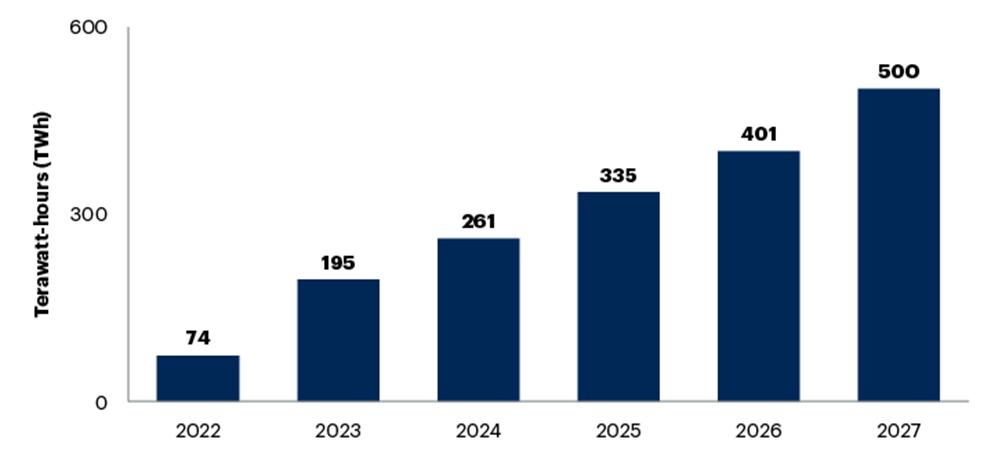Rapid growth in energy consumption for GenAI will exceed the capacity of power utilities
Artificial Intelligence (AI) and Generative Artificial Intelligence (GenAI) are driving a rapid increase in electricity consumption, with data centers expected to grow by up to 160% over the next two years, according to Gartner, Inc. As a result, Gartner predicts that 40% of existing AI data centers will be operationally constrained by power availability by 2027.
“The explosive growth of new hyperscale data centers to implement GenAI is creating an insatiable demand for energy that will outstrip the ability of utility providers to expand capacity fast enough,” he says. Bob Johnson, Vice President and Analyst at Gartner. “This in turn threatens to destabilize energy availability and lead to shortages, which will limit the growth of new data centers for GenAI and other uses from 2026 onwards.”
Gartner estimates that the energy required for Data Centers operating their AI-optimized servers will reach 500 terawatt-hours (TWh) per year in 2027, which is 2.6 times higher than the 2023 level.
Estimated incremental energy consumption of AI data centers, 2022-2027
Energy required for AI Data Centers to operate AI servers

Source: Gartner (November 2024)
“New and larger data centers are being planned to handle the vast amounts of data required to train and deploy the Large Language Models (LLMs) that underpin GenAI applications,” says Johnson. “However, short-term power shortages are likely to continue for years, as new transmission, distribution and power generation capacity may take years to deploy and will not alleviate current issues.”
In the near future, the number of new Data Centers and the GenAI growth will be governed by the availability of energy to operate them. Gartner recommends that companies determine the risks that potential energy shortages will have on all products and services.
Energy prices will rise
The inevitable result of the looming shortage is a rise in energy prices, which will also increase the operating costs of LLMs, according to Gartner.
“Large energy users are working with large producers to secure long-term power supplies that are independent of other grid demands,” Johnson said. “Meanwhile, the cost of energy to operate data centers will increase significantly as operators use economic leverage to secure the power they need. These costs will also be passed on to providers of AI/GenAI products and services.”
Gartner recommends that enterprises evaluate future plans, anticipate higher energy costs, and negotiate long-term contracts for data center services with reasonable energy rates. Enterprises should also consider significant cost increases when developing plans for new products and services, and look for alternative approaches that require less energy.
Sustainability goals will be undermined
The goals of sustainability Zero-carbon economies will also be negatively impacted by short-term solutions to supply more energy, as rising demand forces suppliers to increase production by any means possible. In some cases, this means keeping fossil fuel plants that were scheduled to be decommissioned beyond their planned shutdown date running.
“The reality is that increased use of data centers will lead to increased CO2 emissions to generate the power needed in the near term,” says Johnson. “This, in turn, will make it harder for data center operators and their customers to meet aggressive sustainability targets related to CO2 emissions.”
According to Gartner, data centers require 24/7 power availability, which renewable sources such as wind or solar cannot provide without some form of backup supply during non-powering periods. Reliable 24/7 power can only be generated by hydroelectric, fossil fuel or nuclear power plants. In the longer term, new technologies for improved battery storage (e.g. sodium-ion batteries) or clean energy (e.g. small nuclear reactors) will become available and help achieve sustainability goals.
Gartner recommends that companies reassess sustainability goals related to CO2 emissions in light of future data center requirements and energy sources in the coming years. When developing GenAI applications, one should use as little computing power as possible and consider the feasibility of other options, such as edge computing and other smaller language models.
Gartner clients can learn more at “Emerging Tech: Power Shortages Will Restrict GenAI Growth and Implementation."
About Gartner for Information Technology Executives
Gartner for Information Technology Executives provides insights and objectives for CIOs and IT leaders to help them lead their organizations through digital transformation and drive business growth. Visit: www.gartner.com/en/information-technology.
About Gartner
O Gartner, Inc.. delivers objective, actionable insights that drive smarter decisions and better performance for enterprises’ mission-critical priorities. To learn more, visit www.gartner.com or follow Gartner news and updates for IT executives using #GartnerIT.













